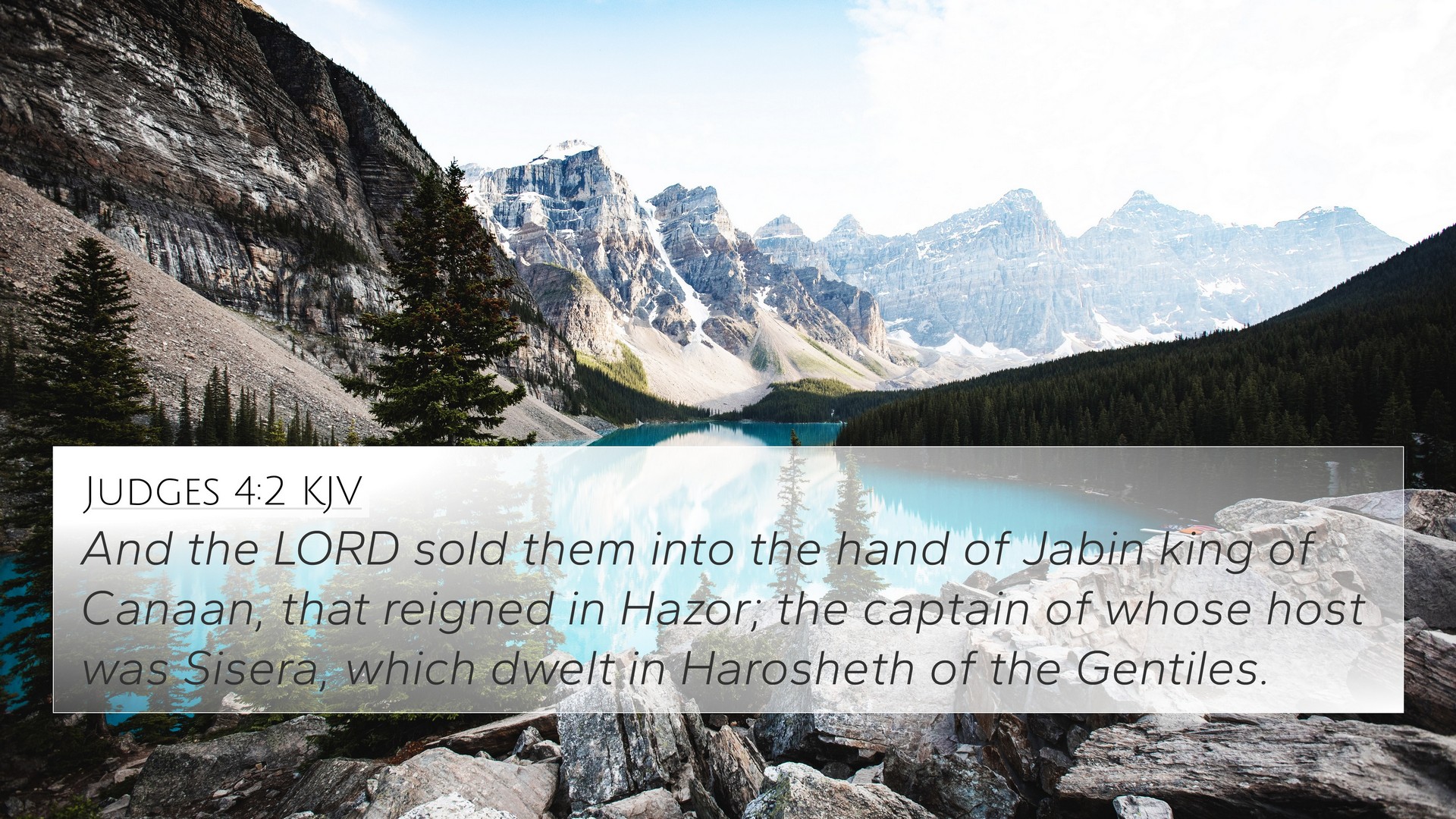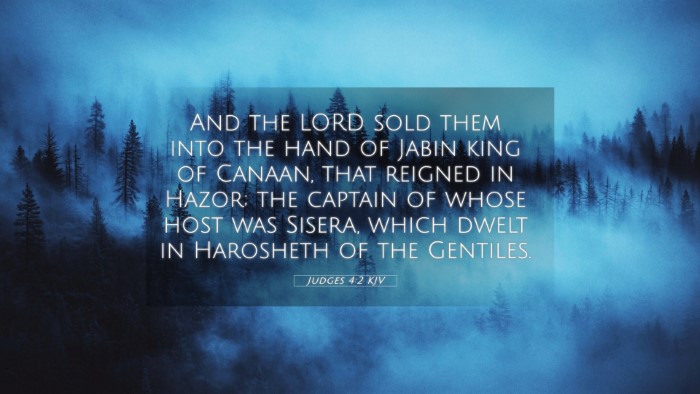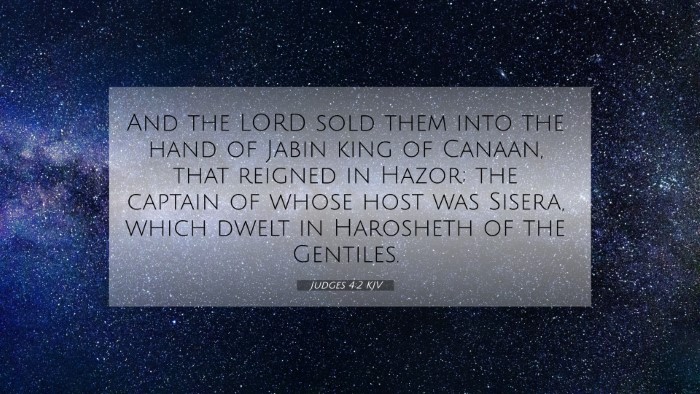Old Testament
Genesis Exodus Leviticus Numbers Deuteronomy Joshua Judges Ruth 1 Samuel 2 Samuel 1 Kings 2 Kings 1 Chronicles 2 Chronicles Ezra Nehemiah Esther Job Psalms Proverbs Ecclesiastes Song of Solomon Isaiah Jeremiah Lamentations Ezekiel Daniel Hosea Joel Amos Obadiah Jonah Micah Nahum Habakkuk Zephaniah Haggai Zechariah MalachiJudges 4:2 Similar Verses
Judges 4:2 Cross References
And the LORD sold them into the hand of Jabin king of Canaan, that reigned in Hazor; the captain of whose host was Sisera, which dwelt in Harosheth of the Gentiles.
Uncover the Rich Themes and Topics of This Bible Verse
Listed below are the Bible themes associated with Judges 4:2. We invite you to explore each theme to gain deeper insights into the Scriptures.
Judges 4:2 Cross Reference Verses
This section features a detailed cross-reference designed to enrich your understanding of the Scriptures. Below, you will find carefully selected verses that echo the themes and teachings related to Judges 4:2 KJV. Click on any image to explore detailed analyses of related Bible verses and uncover deeper theological insights.

Joshua 11:1 (KJV) »
And it came to pass, when Jabin king of Hazor had heard those things, that he sent to Jobab king of Madon, and to the king of Shimron, and to the king of Achshaph,

Judges 4:16 (KJV) »
But Barak pursued after the chariots, and after the host, unto Harosheth of the Gentiles: and all the host of Sisera fell upon the edge of the sword; and there was not a man left.
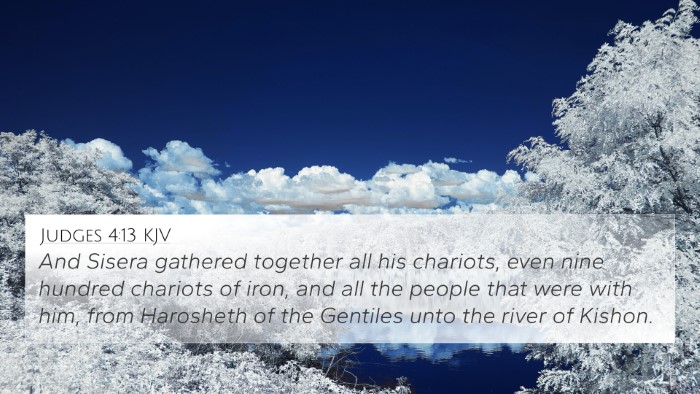
Judges 4:13 (KJV) »
And Sisera gathered together all his chariots, even nine hundred chariots of iron, and all the people that were with him, from Harosheth of the Gentiles unto the river of Kishon.
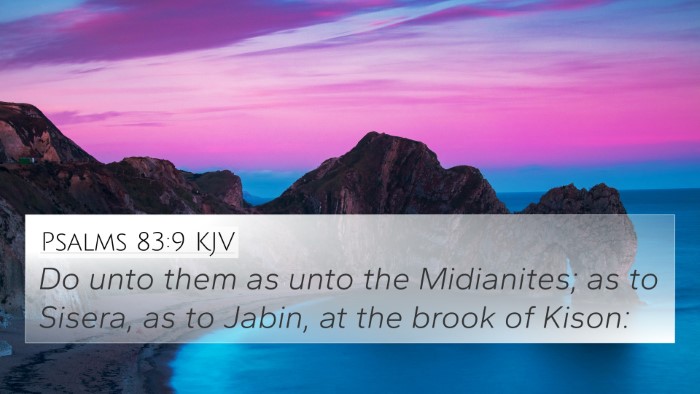
Psalms 83:9 (KJV) »
Do unto them as unto the Midianites; as to Sisera, as to Jabin, at the brook of Kison:
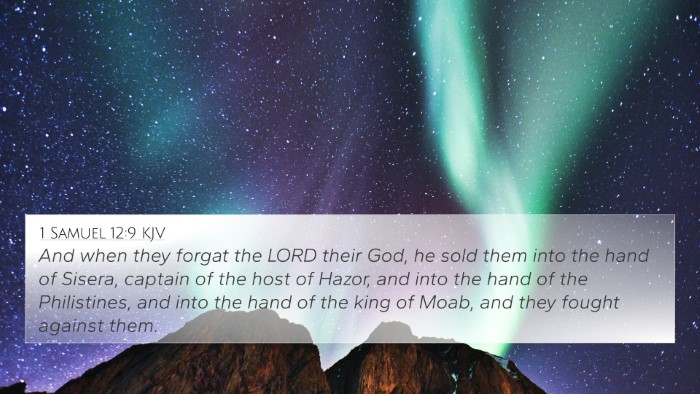
1 Samuel 12:9 (KJV) »
And when they forgat the LORD their God, he sold them into the hand of Sisera, captain of the host of Hazor, and into the hand of the Philistines, and into the hand of the king of Moab, and they fought against them.

Joshua 11:10 (KJV) »
And Joshua at that time turned back, and took Hazor, and smote the king thereof with the sword: for Hazor beforetime was the head of all those kingdoms.
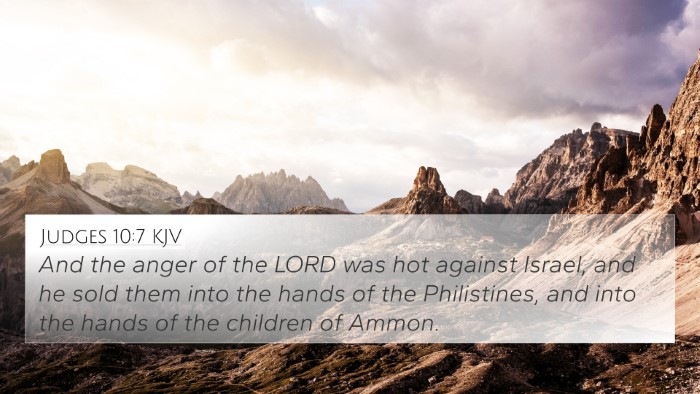
Judges 10:7 (KJV) »
And the anger of the LORD was hot against Israel, and he sold them into the hands of the Philistines, and into the hands of the children of Ammon.
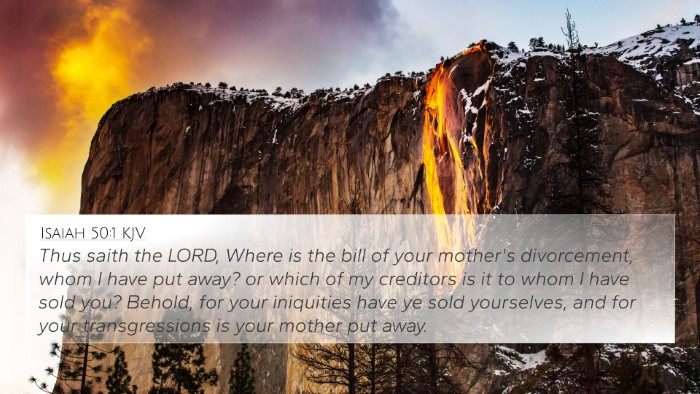
Isaiah 50:1 (KJV) »
Thus saith the LORD, Where is the bill of your mother's divorcement, whom I have put away? or which of my creditors is it to whom I have sold you? Behold, for your iniquities have ye sold yourselves, and for your transgressions is your mother put away.

Judges 2:14 (KJV) »
And the anger of the LORD was hot against Israel, and he delivered them into the hands of spoilers that spoiled them, and he sold them into the hands of their enemies round about, so that they could not any longer stand before their enemies.
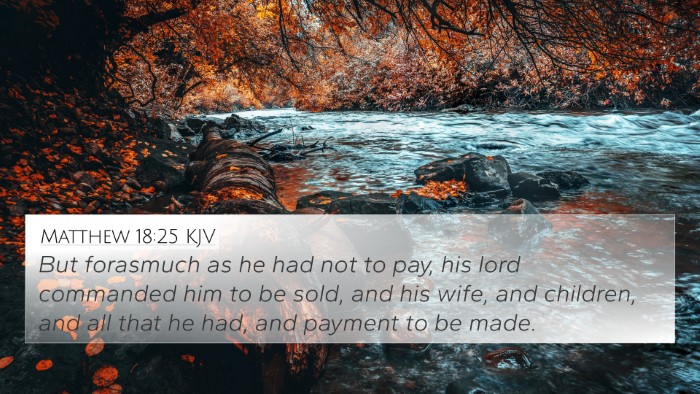
Matthew 18:25 (KJV) »
But forasmuch as he had not to pay, his lord commanded him to be sold, and his wife, and children, and all that he had, and payment to be made.
Judges 4:2 Verse Analysis and Similar Verses
Understanding Judges 4:2
Judges 4:2 states, "And the Lord sold them into the hand of Jabin king of Canaan, that reigned in Hazor; the captain of whose host was Sisera, which dwelt in Harosheth of the Gentiles."
This verse serves as a pivotal point in the narrative of the Israelites' struggle during the time of the judges. It reflects God's sovereignty and the consequences of Israel's disobedience.
Insights from Public Domain Commentaries
Matthew Henry's Commentary
Matthew Henry emphasizes that the phrase "the Lord sold them" indicates divine abandonment due to Israel's sin. The Israelites turned away from God, leading to their subjugation under foreign powers. Henry points out that God's judgment often comes through allowing enemies to prevail.
Albert Barnes' Commentary
Albert Barnes elaborates that Jabin, the king of Canaan, symbolizes the formidable enemies that Israel faces when they stray from God's commandments. The term "sold them" signifies not just physical captivity but also spiritual decay. Barnes indicates that the term "captain of whose host was Sisera" identifies a key figure in the oppression of Israel, illustrating the need for deliverance.
Adam Clarke's Commentary
Adam Clarke discusses the historical context of King Jabin and Sisera's role in the narrative. He highlights their oppression against Israel and posits that this period signifies a time of great hopelessness for the Israelites. Clarke stresses that the deliverance promised by God reflects His mercy and the cyclical nature of Israel's faithfulness and rebellion.
Key Themes in Judges 4:2
- Divine Sovereignty: This verse illustrates how God controls the fate of nations and individuals based on their faithfulness.
- Consequences of Disobedience: The Israelites' worship of other gods directly led to their oppression, showing a clear link between sin and suffering.
- Need for Deliverance: The mention of Sisera underscores the imminent need for a savior figure, which ultimately leads to the emergence of Deborah and Barak as deliverers.
- Historical Context: This verse enriches the understanding of Israel's turbulent history during the judges' period.
Bible Cross-References
To fully grasp Judges 4:2, the following cross-references enhance understanding:
- Deuteronomy 28:25: Discusses the curses for disobedience that lead to defeat before enemies.
- Judges 3:8: Provides earlier context of Israel's disobedience and consequent oppression.
- Jeremiah 5:15: Speaks of Israel's enemies, illustrating God’s disciplinary actions throughout history.
- Psalm 106:41: Reflects similar themes of Israel being handed over to their enemies.
- Romans 1:24: Highlights God's action of giving people over to their sinful desires.
- Hebrews 11:32-34: Mentions the faith of those who fought against oppression, which relates to Deborah and Barak's story.
- 1 Samuel 12:9: Notes the cycle of disobedience leading to oppression.
Connecting Themes and Their Significance
This verse establishes a precedent for understanding the cyclical nature of sin and redemption found throughout the Bible. The connections between Israel's history and the New Testament teachings about deliverance through Christ can also be explored.
Comparative Analysis with New Testament Teachings
By examining Judges 4:2 alongside New Testament scriptures, one can draw parallels between the oppression faced by the Israelites and the spiritual oppression discussed in scriptures such as John 8:34, where Jesus says, "Everyone who practices sin is a slave to sin." This highlights the theme of deliverance that unites both Testaments.
Thematic Connection Examples
- Deliverance from Oppression: Judges 4:2 can be linked with Luke 4:18, where Jesus proclaims liberty to the captives.
- God's Sovereignty: Romans 8:28 reinforces the idea of God's control over all circumstances.
- Faith and Obedience: James 2:26 emphasizes that faith without works is dead, resonating with the cycle of obedience and consequence found in Judges.
Applications for Modern Readers
Judges 4:2 serves as a sober reminder of the consequences of turning away from God. For modern readers, it encourages self-examination regarding one's spiritual walk and the importance of remaining faithful to God's covenant. Additionally, it underscores the consistency of God's nature across both Old and New Testaments, offering hope through the prophecy of deliverance fulfilled in Jesus Christ.
Tools for Bible Cross-Referencing
Understanding the interconnectedness of scripture can be enhanced through various tools:
- Bible Concordance: A valuable resource for finding specific verses related to themes of judgment and deliverance.
- Bible Cross-Reference Guide: Helps identify related verses that reinforce themes present in Judges 4:2.
- Cross-Reference Bible Study: Methods that involve comparing similar biblical narratives and teachings.
Conclusion
Judges 4:2 provides significant insight into the recurring themes of sin, punishment, and the need for deliverance throughout the scriptures. By exploring cross-references and thematic connections, readers can deepen their understanding of God's dealings with His people both in historical context and contemporary faith experiences.
